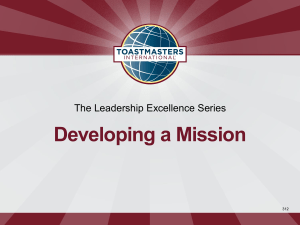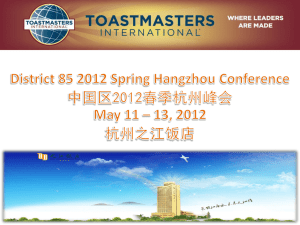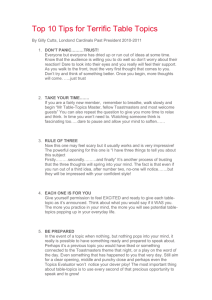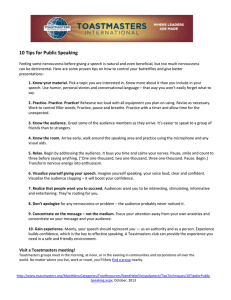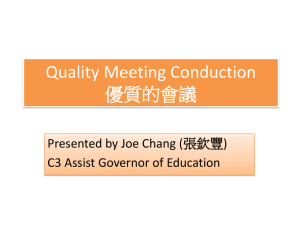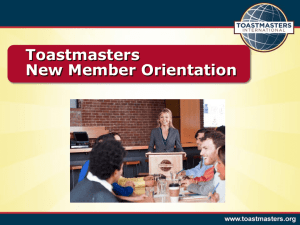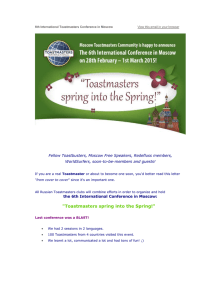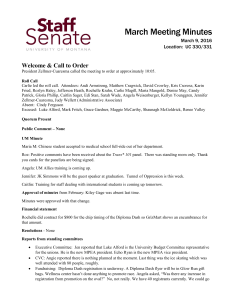High-Performance Leadership
advertisement
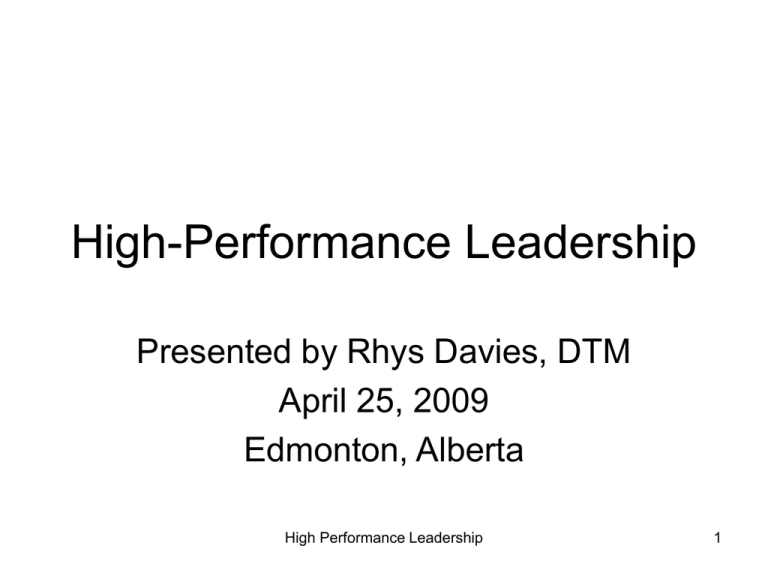
High-Performance Leadership Presented by Rhys Davies, DTM April 25, 2009 Edmonton, Alberta High Performance Leadership 1 High Performance Leadership • Part I – Learning About Leadership • Part II – Choosing Your Objective • Part III – Action Phase #1: Winning Commitment to Your Objective • Part IV – Action Phase #2: Working the Plan • Part V – Analyzing and Presenting Your Results High Performance Leadership 2 Part I – Learning About Leadership On many occasions, leaders have changed the course of history. When we think of leadership, we might think of high profile public figures. Leadership is found in many walks of life. For example, we might think of the following leaders. High Performance Leadership 3 Some Influential Leaders • Business: Bill Gates, Anita Roddick • Politics: Stephen Harper, Hilary Clinton • Religion: Pope John Paul II, Mother Teresa • Academic/Literature: Albert Einstein, J. K. Rowling • Equal Rights: Emily Murphy, Martin Luther King, Jr. High Performance Leadership 4 Some Influential Leaders • Entertainment: Oprah Winfrey, Bono (U2) • Sports: Wayne Gretzky, Muhammad Ali • Military: Dwight Eisenhower, Colin Powell The influence of these leaders grew beyond their profession or trade. On a local level, we all have (or had) leaders that have mentored our growth. High Performance Leadership 5 Local Heroes • Family Members (Mom, Dad, and others) • Teachers • Community Leaders • Volunteers • Co-Workers • Friends Each leader has succeded by developing their own leadership style. High Performance Leadership 6 Leadership Styles (U. S. Army) • Authoritative/Autocratic – Leader has command and control (no input). • Participative/Democratic – Leader seeks group input, but still makes decisions. • Delegative/Free Reign – Leader delegates decision-making (not responsiblility) to team members. A good leader uses all three styles. High Performance Leadership 7 Service Leadership • In many cases, people have legitimate authority through a leadership or management title, or sometimes through seniority. However, outside the formal structure, leadership abilities often depend on the leader’s ability to empower others. • In Toastmasters, Service Leadership drives the membership of the organization. High Performance Leadership 8 High Performance Leadership • High Performance Leadership is your chance to build your leadership skills by following the five parts in the book, and developing the six dimensions of leadership. High Performance Leadership 9 Six Dimensions of Leadership • • • • • • Vision and Values Direction Persuasion Support Development Appreciation High Performance Leadership 10 Selecting a Project • Although many projects are Toastmastersrelated (e.g., Toastmasters Club Anniversaries, COT/TLI, Specialty Projects), you may choose a nonToastmasters project. This requires some thought and planning, and I would recommend discussing them with your Guidance Committee. High Performance Leadership 11 Guidance Committee • Usually 3 People • It is recommended to have at least one Toastmaster on the Guidance Committee. • Your Guidance Committee will evaluate your progress, and will meet with you during at each stage of your project. High Performance Leadership 12 Part II – Choosing Your Objective • After completing the first part of High Performance Leadership, you’re ready to start on your project. • But wait! You just have the Vision for your project. • This section deals with describing your vision, your Mission Statement, and Core Values High Performance Leadership 13 Part II – The Key Elements • • • Describe Your Vision in Detail – What do you see as the outcome or end result of your project? Mission Statement – This gives a more concrete version of your vision. Core Values – These values should help you and your team achieve is mission. Usually, a few specifically defined core values are sufficient. High Performance Leadership 14 Communicating Your Vision • Once your Mission Statement and Core Values are complete, you can work on your speech you plan to share with your club. • This speech will convince others of your vision, and tying your vision to their needs. High Performance Leadership 15 Part III – Action Phase I: Winning Commitment to Your Objective • How to “Enroll” Others in Your Vision • How well can you persuade people? With your vision and core values defined in the last section, you will know what you are selling. However, you can sell your vision by showing your belief in it. Depending on the vision, it may require a strategy for convincing people to buy into it. High Performance Leadership 16 Identifying Stakeholders • Think of potential people who would be interested in your vision. Some may be interested right off the bat, and there may be potential prospects who you can contact to sell your idea. However, there may be people who object to your project and these are people who will need convincing. High Performance Leadership 17 Your Action Team • Before going ahead with recruiting your action team, look at the potential goals, tasks and timetables that have to be developed. • Next, look at the potential people you will need to accomplish these tasks and goals. • Identify an organizational structure, and match the tasks and goals to potential people you have identified. High Performance Leadership 18 First Action Team Meeting • This will be the first chance that the Action Team will get to meet. • Explain objective and ask for team members’ input. • Review Vision, Mission and Core Values. • Give Team Members a sense of ownership. • This will lead to the Action Strategy. High Performance Leadership 19 Your Action Strategy • An action strategy can help you determine where to best allocate resources to accomplish team goals. • The goal of an action strategy is to determine which actions or strategies will have the greatest leverage value. High Performance Leadership 20 Your Action Plan Here’s the fun part. Now you get to break down your action strategy into key result areas. For example, your key result areas for a Toastmasters anniversary may include: • Marketing and promotion of the anniversary meeting. • Securing facilities and catering for the event. • Organizing the meeting program and ceremonies. • Procuring door prizes for the meeting. High Performance Leadership 21 How to Decide on Roles, Goals and Timetables • This is where the list of tasks you compiled earlier will come in handy. With your action team, you will be able to match team members with each of the tasks, and assign them to the respective result areas. High Performance Leadership 22 SMART Goals • • • • • Specific Measurable Action-oriented Realistic Timeline attached. High Performance Leadership 23 Part IV – Action Phase #2: Working the Plan • With your Action Team and Action Plan together, along with your goals and timelines, this is where your team can kick off the project. • In Part II, you worked on Vision and Values, in Part III, you worked on Persuasion and Direction. • Part IV focuses on the other three dimensions. High Performance Leadership 24 The Leadership Challenge • • • • • • Kouzes and Posner (The Leadership Challenge) offer five strategies for strong team performance. Model the Way Inspire a Shared Vision Challenge the Process Enable Others to Act Encourage the Heart High Performance Leadership 25 Next Steps in Part IV • Periodic Meetings – Make sure the team stays in touch and make sure that you stay on top of the issues. • Review Your Own Progress – Look at the six service leadership dimensions, and see how you have improved. • Dealing with Obstacles, Setbacks and Problems – Group Discussion • Dealing with People Problems – Group Discussion High Performance Leadership 26 Part V – Analyzing and Presenting Your Results • After the completion of the project, you can assess your performance with the previous four parts of the project and the six dimensions of leadership. • Most High-Performance Leadership projects are successful as a result of your vision and your team’s efforts. • However, some projects may not have the same success (I failed on my first project), but they still provide a lot of lessons. You can still explain what you have learned. High Performance Leadership 27 Your HPL Summary Speech Should include: • Only the highlights. • Your feelings about the learning process. • One or two interesting aspects of the experience. • A few of the key leadership behaviours you found most valuable. • A story or two about your experiences. High Performance Leadership 28 Leadership Excellence Award • Once your project is complete, you can apply for the Leadership Excellence Award. • This award application requires the speech evaluation, as well as signatures from the Guidance Committee. • The Leadership Excellence award is partial credit towards AL Silver. High Performance Leadership 29 Conclusion • High Performance Leadership is an opportunity to organize a project, and identify and develop your leadership skills. • By following the modules in the book, you will be able to lead teams and future projects, whether they are inside or outside of Toastmasters. High Performance Leadership 30
